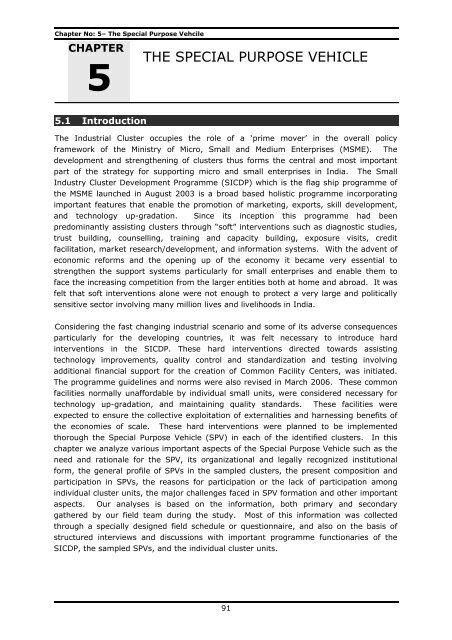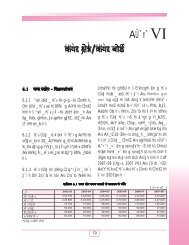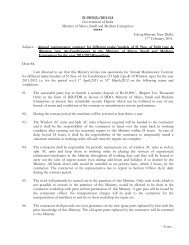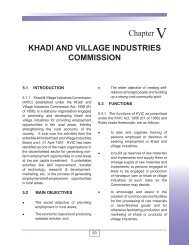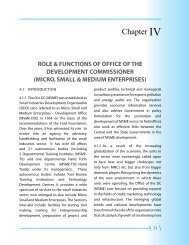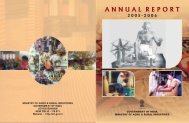Evaluation Study MSE Cluster Development - Ministry of Micro ...
Evaluation Study MSE Cluster Development - Ministry of Micro ...
Evaluation Study MSE Cluster Development - Ministry of Micro ...
Create successful ePaper yourself
Turn your PDF publications into a flip-book with our unique Google optimized e-Paper software.
Chapter No: 5– The Special Purpose VehcileCHAPTER5THE SPECIAL PURPOSE VEHICLE5.1 IntroductionThe Industrial <strong>Cluster</strong> occupies the role <strong>of</strong> a ‘prime mover’ in the overall policyframework <strong>of</strong> the <strong>Ministry</strong> <strong>of</strong> <strong>Micro</strong>, Small and Medium Enterprises (MSME). Thedevelopment and strengthening <strong>of</strong> clusters thus forms the central and most importantpart <strong>of</strong> the strategy for supporting micro and small enterprises in India. The SmallIndustry <strong>Cluster</strong> <strong>Development</strong> Programme (SICDP) which is the flag ship programme <strong>of</strong>the MSME launched in August 2003 is a broad based holistic programme incorporatingimportant features that enable the promotion <strong>of</strong> marketing, exports, skill development,and technology up-gradation. Since its inception this programme had beenpredominantly assisting clusters through “s<strong>of</strong>t” interventions such as diagnostic studies,trust building, counselling, training and capacity building, exposure visits, creditfacilitation, market research/development, and information systems. With the advent <strong>of</strong>economic reforms and the opening up <strong>of</strong> the economy it became very essential tostrengthen the support systems particularly for small enterprises and enable them t<strong>of</strong>ace the increasing competition from the larger entities both at home and abroad. It wasfelt that s<strong>of</strong>t interventions alone were not enough to protect a very large and politicallysensitive sector involving many million lives and livelihoods in India.Considering the fast changing industrial scenario and some <strong>of</strong> its adverse consequencesparticularly for the developing countries, it was felt necessary to introduce hardinterventions in the SICDP. These hard interventions directed towards assistingtechnology improvements, quality control and standardization and testing involvingadditional financial support for the creation <strong>of</strong> Common Facility Centers, was initiated.The programme guidelines and norms were also revised in March 2006. These commonfacilities normally unaffordable by individual small units, were considered necessary fortechnology up-gradation, and maintaining quality standards. These facilities wereexpected to ensure the collective exploitation <strong>of</strong> externalities and harnessing benefits <strong>of</strong>the economies <strong>of</strong> scale. These hard interventions were planned to be implementedthorough the Special Purpose Vehicle (SPV) in each <strong>of</strong> the identified clusters. In thischapter we analyze various important aspects <strong>of</strong> the Special Purpose Vehicle such as theneed and rationale for the SPV, its organizational and legally recognized institutionalform, the general pr<strong>of</strong>ile <strong>of</strong> SPVs in the sampled clusters, the present composition andparticipation in SPVs, the reasons for participation or the lack <strong>of</strong> participation amongindividual cluster units, the major challenges faced in SPV formation and other importantaspects. Our analyses is based on the information, both primary and secondarygathered by our field team during the study. Most <strong>of</strong> this information was collectedthrough a specially designed field schedule or questionnaire, and also on the basis <strong>of</strong>structured interviews and discussions with important programme functionaries <strong>of</strong> theSICDP, the sampled SPVs, and the individual cluster units.91


